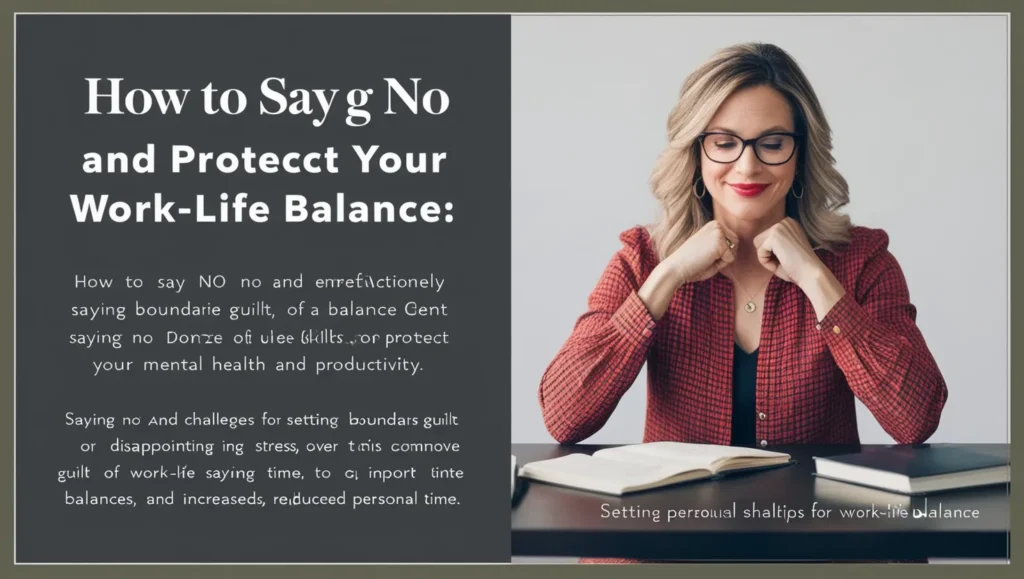How to Say No and Protect Your Work Life Balance
In today’s fast-paced world, many professionals struggle to balance the demands of their careers with personal commitments. The inability to say “no” often leads to overcommitment, burnout, and a disrupted work-life balance. Mastering the art of saying no is not just a skill but a necessity for a healthy, productive life. Let’s explore why saying no is essential, how to do it effectively, and how it can help you safeguard your work-life balance.
Why Saying No is Crucial
Prevents Burnout
Constantly saying yes to every request, task, or meeting may seem like a way to be helpful, but it can quickly overwhelm you. Overcommitment leads to exhaustion, decreased productivity, and emotional fatigue.
Sets Boundaries
Saying no helps establish clear boundaries, ensuring that your personal time is respected and protected.
Increases Productivity
By declining non-essential tasks, you free up time to focus on high-priority projects, ultimately improving the quality of your work.
Encourages Respect
A thoughtful no can convey self-awareness and professionalism, encouraging others to value your time.
Strategies to Say No Effectively
Understand Your Priorities
Before committing to any request, evaluate your current workload and personal commitments. Ask yourself:
- Does this align with my goals?
- Do I have the bandwidth for this task?
Having clarity on your priorities makes it easier to decline tasks that don’t align with them.
Be Polite but Firm
A straightforward yet respectful approach works best. For example:
- Instead of: “I’m too busy; I can’t help.”
- Try: “Thank you for considering me for this. Unfortunately, I can’t commit at the moment due to my existing workload.”
This response acknowledges the request while asserting your limitations.
Offer Alternatives
If you’re unable to take on a task, suggest other resources or individuals who might be better suited. For example:
- “I’m unable to take this on right now, but [Colleague] has experience with similar projects and might be able to assist.”
Use “No” as a Complete Sentence
Sometimes, a concise no is enough. Avoid over-explaining or justifying your decision, as it can invite pushback. For instance:
- “I appreciate the opportunity, but I’ll have to decline.”
Schedule Buffer Time
Don’t overload your calendar. Leave room for unexpected tasks or personal time. Saying no becomes easier when your schedule visibly reflects your limits.
Practice Assertiveness
Confidence in your decision helps convey that your no is non-negotiable. Assertiveness doesn’t mean being rude; it means standing firm while being respectful.
How Saying No Protects Work-Life Balance
Creates Time for Personal Priorities
By turning down work that isn’t urgent or essential, you can dedicate more time to family, hobbies, and self-care.
Reduces Stress
Knowing you’re not overburdened can ease mental pressure and improve overall well-being.
Improves Relationships
Overcommitment often results in neglecting personal relationships. Saying no to unnecessary work helps you nurture meaningful connections in your personal life.
Fosters Self-Respect
When you honor your own limits, you set an example for others to do the same, reinforcing mutual respect in professional and personal interactions.
Overcoming the Guilt of Saying No
Many people feel guilty when they say no, fearing they’ll disappoint others or miss opportunities. To overcome this guilt:
Reframe Your Perspective
Realize that saying no to one thing means saying yes to something more important.
Focus on the Bigger Picture
Remember that declining non-essential tasks benefits your overall performance and health.
Communicate Clearly
Most people appreciate honesty and transparency. A well-explained no is unlikely to harm relationships.
Final Thoughts
Saying no is not a sign of weakness or unwillingness; it’s a mark of self-awareness and strength. It enables you to protect your time, energy, and well-being, leading to a more balanced and fulfilling life.
The next time you’re faced with a request that threatens to derail your work-life balance, take a moment to pause, assess, and confidently say no when necessary. By doing so, you’ll not only safeguard your professional performance but also enhance your personal happiness and health.

